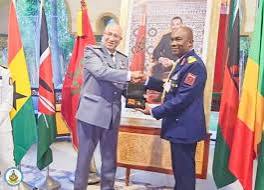In a deliberate effort to strengthen Nigeria’s military-industrial capacity and align the country’s defence outlook with international best practices, the Air Force War College (AFWC) has embarked on a strategic continental and intercontinental tour, engaging top-level defence and security stakeholders in Morocco and Türkiye.
The high-profile study tour, held under the theme “Military Industrial Complex and National Development: Lessons for Nigeria,” brought together senior military officers and defence scholars to explore how both nations have successfully integrated military advancements into national growth. The Nigerian delegation focused on critical areas such as defence innovation, indigenous weapons manufacturing, and the strategic policy frameworks that guide military self-reliance in both countries.
In Morocco, participants engaged with security institutions that have grown into formidable regional players, with significant investment in drone technology, military logistics, and cross-border intelligence coordination. The delegation witnessed how Morocco’s defence infrastructure is designed to support both internal stability and regional peacekeeping operations, leveraging partnerships across Africa and the Middle East.
In Türkiye, a country now globally recognised for its domestic military production and export capabilities, the AFWC delegation studied key elements of defence planning and execution. Türkiye’s ability to develop homegrown military technology, including unmanned aerial vehicles (UAVs), naval warships, and armoured combat systems, was a focal point. The delegation assessed how Türkiye’s strategic blend of public-private collaboration and policy-driven R&D has transformed it into one of the world’s emerging defence powers.
Speaking at the end of the tour, the Commandant of the Air Force War College, Air Vice Marshal Gabriel Kehinde, described the experience as transformative. “This tour has provided our officers with not only knowledge but practical insight into how nations can transform their defence sectors into engines of innovation and national development,” he said.
Back in Nigeria, participants have already begun submitting detailed reports on the comparative strengths, challenges, and policy models observed. These reports are expected to influence future reforms within the Nigerian Air Force, particularly in areas such as indigenous weapons development, defence procurement, and strategic military partnerships.
The initiative is part of the Nigerian Air Force’s wider efforts to professionalise the force, promote self-reliance, and prepare officers for the complexity of modern warfare and international security diplomacy. At a time when national security is deeply intertwined with technological capacity and defence economy, the tour reflects a timely response to Nigeria’s evolving defence needs.
This engagement also comes amid growing regional security challenges in West Africa, making Nigeria’s internal capacity for defence innovation not just a matter of national pride but of strategic necessity. With insights drawn from Morocco’s regional diplomacy and Türkiye’s defence entrepreneurship, the Nigerian military is set to adopt a more pragmatic and globally responsive posture in safeguarding the nation’s interests.
